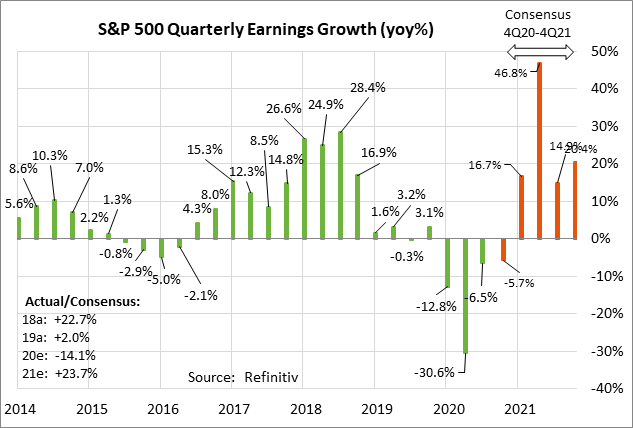- Weekly global market focus
- House works on pandemic aid bill while Senate confirms cabinet nominations
- Biden pandemic aid bill attracts increasing Republican resistance
- U.S. Covid new-infection average falls to 7-week lowÂ
- Q4 earnings season ramps up
Weekly global market focus — The U.S. markets this week will focus on (1) the prospects for President Biden’s $1.9 trillion pandemic aid package, (2) the Tues/Wed FOMC meeting where the market is hoping Fed Chair Powell will reject recent QE tapering talk, (3) the improving U.S. pandemic statistics, (4) Q4 earnings season, which heats up this week with reports from 120 of the S&P 500 companies, (5) the Treasury’s sale $211 billion of T-notes on Monday through Thursday, and (6) a busy U.S. economic calendar with the highlight being Thursday’s U.S. Q4 GDP report (expected +4.2% q/q annualized).
In Europe, the focus will remain on the pandemic surge and the lockdowns across much of Europe. In Asia, the markets are watching how U.S.-Chinese relations will change with the new Biden administration. This coming Saturday’s Jan Chinese PMI reports are expected to show declines (manufacturing PMI expected -0.3 to 51.6, and non-manufacturing expected -0.8 to 54.9).
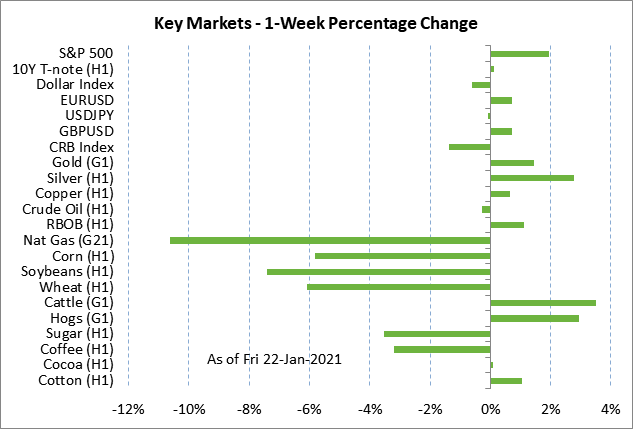
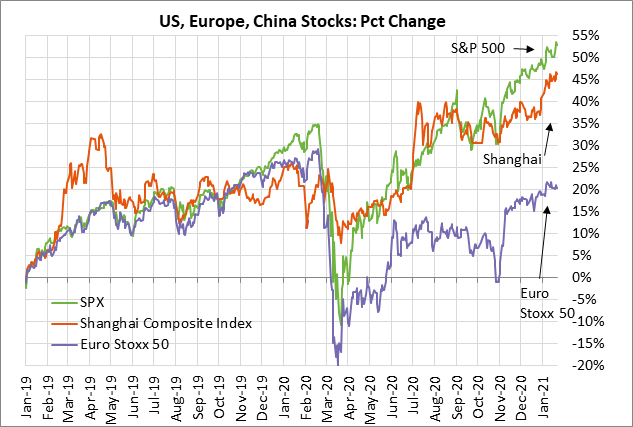
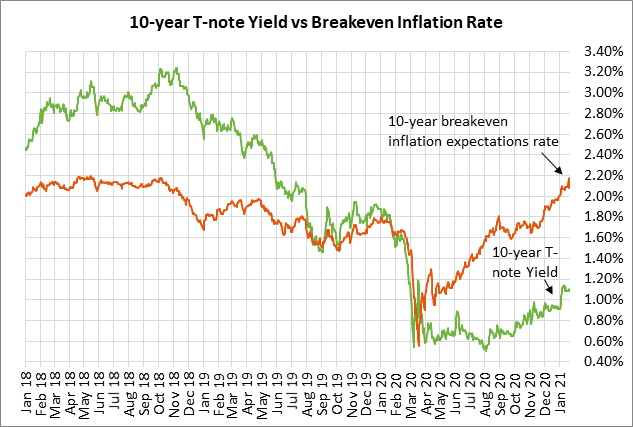
House works on pandemic aid bill while Senate confirms cabinet nominations — Speaker Pelosi said that House committees this week will start putting together the legislation for President Biden’s $1.9 trillion pandemic aid proposal. Ms. Pelosi said that the full House will take up the bill in early February. The House should be able to easily pass the new pandemic aid bill given their track record of passing large pandemic aid bills last year.
The Senate this week and next week will be busy getting committees organized and confirming President Biden’s cabinet nominees. The Senate today is expected to formally receive the article of impeachment from the House. Leaders Schumer and McConnell late last week reached an agreement for Mr. Trump’s impeachment trial to start on February 8.
Senate leaders Schumer and McConnell have yet to reach an agreement on an organizing resolution covering committee assignments and procedural matters. As a result, some Senate committees still have a Republican majority and chair. Leader McConnell is trying to strong-arm Senate Majority Leader Schumer into agreeing to preserve the legislative filibuster, which Mr. Schumer has so far rejected. It remains unclear when Schumer-McConnell will reach a deal on an organizing resolution.
The Senate today is expected to confirm Janet Yellen as the new Treasury Secretary after she received a unanimous vote of approval in the Senate Finance Committee last Friday. The Senate has so far confirmed only National Intelligence Director Avril Haines and Defense Secretary Lloyd Austin.
Biden pandemic aid bill attracts increasing Republican resistance — Key Republicans last week voiced opposition to President Biden’s $1.9 trillion pandemic aid proposal. President Biden’s top economic advisor, Brian Deese, on Sunday held a virtual meeting with the bipartisan group of Senators who were instrumental in producing the last bipartisan pandemic aid bill.
Democrats’ current plan is for the House to pass the $1.9 trillion pandemic aid bill within the next several weeks and forward the bill to the Senate for its consideration. The Biden administration and Majority Leader Schumer will then gauge whether there is any chance of getting enough Republicans on board for a slimmed-down bipartisan pandemic aid bill. If not, then Democrats have said they are prepared to instead use the budget reconciliation process to push a pandemic aid bill through Congress, even if they can’t get all their desired elements of a pandemic aid package into a budget reconciliation bill.
U.S. Covid new-infection average falls to 7-week low — There is some good news on the pandemic front with the 7-day average of new U.S. Covid infections on Saturday falling to a 7-week low of 176,763, according to data compiled by Bloomberg. However, the level of Covid deaths remains very high, with the 7-day average at 3,087 deaths per day.
The markets are hoping that the Biden administration will be successful with its push to increase substantially the pace of vaccinations. Bloomberg reports that there have been 21.1 million vaccine doses given so far in the U.S., and that the 7-day average of daily doses is at 1.06 million.
If there is a seasonal pattern with Covid, as there is with flu, there are hopes that Covid infections may soon peak and move lower into spring, pushed even lower by vaccinations. However, the wildcard is the extent to which the more contagious Covid variants might sweep the country and keep the infection rates high.
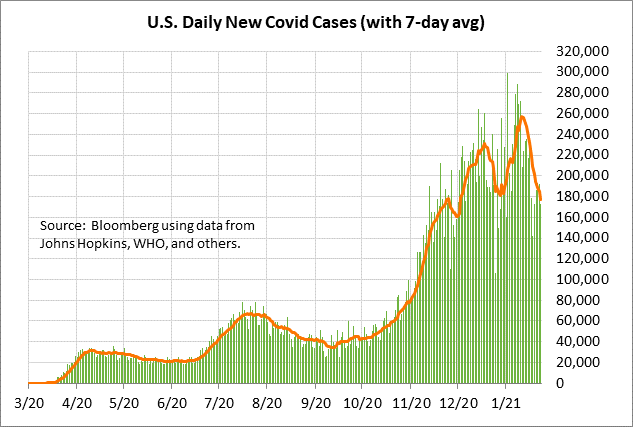
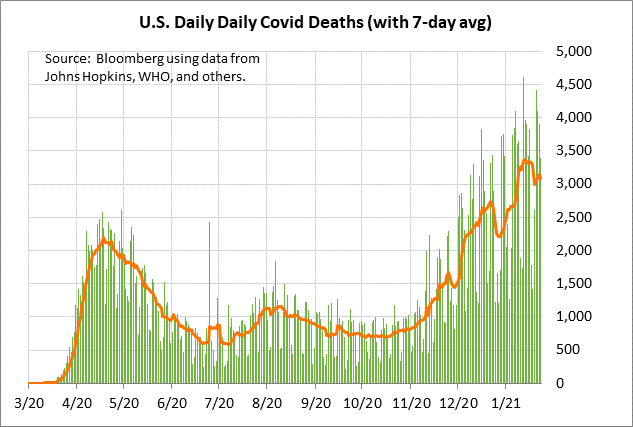
Q4 earnings season ramps up — Q4 earnings season ramps up this week with reports from 120 of the S&P 500 companies. Notable reports this week include Microsoft, Capital One, Starbucks, and GE on Tuesday; Apple, Facebook, and AT&T on Wednesday; Visa, Mastercard, Pultegroup, McDonald’s, and American Airlines on Thursday; and Caterpillar on Friday.
Q4 earnings reports have been better than expected, giving a boost to the stock market. Of the 66 SPX companies that have reported thus far, 87.9% have beaten the consensus, which is much better than the long-term average of 65.3% and the 4-quarter average of 75.5%, according to Refinitive.
The consensus is for SPX earnings growth in Q4 of -5.7% (-2.2% ex-energy), according to Refinitiv. The consensus is for calendar-year 2020 SPX earnings growth to fall -14.1% due to the pandemic. Looking ahead, the consensus is for SPX earnings growth in 2021 to recover by +23.7%.
